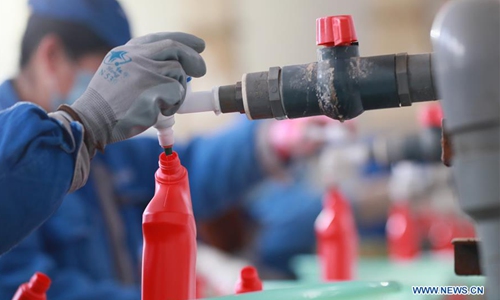HOME >> CHINA
Little impact from use of disinfectants amid COVID-19: environmentalists
By Du Qiongfang Source:Globaltimes.cn Published: 2020/2/19 13:08:19

Workers work on a production line of disinfectant at a workshop in Yuncheng City, north China's Shanxi Province, Jan. 27, 2020. To help fight the outbreak of pneumonia caused by novel coronavirus, workers in factories in Shanxi work overtime to meet with the increasing need. (Photo: Xinhua)
Chinese analysts dispelled environmental pollution concerns over excessive use of disinfectants in cities amid the outbreak of novel coronavirus pneumonia, saying the impact on the environment is almost negligible with standard sewage treatment.
As well as in household cleaning, public venues' and hospitals' disinfection, disinfectants have been widely used on the roads, buildings and greenbelts by spraying in many Chinese cities, which stirred concerns about pollution of surface water, soil, vegetation and even underground water, which is related to the safety of drinking water and agricultural irrigation.
The commonly used disinfectants can roughly be divided into two categories of poisonous chlorine-containing disinfectants and non-toxic alcohol disinfectants. Environmental protection expert Peng Yingdeng told the Global Times that what may cause concern is extensive spraying of the poisonous chlorine on the roads and in the greenbelts.
"The disinfectants will go into sewer pipes, then enter the drainage system, and then the rainwater system and finally into surface water and waters. If the disinfection is overly used, it can go into underground water," Peng said.
Meanwhile, the disinfectant sprayed in the greenbelts will be partly absorbed by soil and will be mixed with rainwater and infiltrate slowly into underground water.
"But both of these ways have to undergo the processes of migration and transformation which take a very long time, so it almost has no influence on underground water," Peng said.
Besides, waste water generated in hospitals where disinfectants are massively used will enter sewage plants. With proper treatment, the influence of disinfectants is also negligible, Peng noted.
Alcohol disinfectants are almost non-toxic to the human body and have no negative influence on the environment, whereas the chlorine-containing disinfectants are more effective in fighting viruses and bacteria. But with small doses of the chlorine-containing disinfectants used in house cleaning and in public venue disinfection, the influence on the environment is almost negligible.
"It is impossible for disinfectants used in household cleaning to negatively affect the environment, because such disinfection methods cannot get into the environment, such as water. It can only affect the safety of the house rather than the environment if there is overuse of these volatile, flammable and explosive disinfectants," said Peng who noted that there have been several cases of fire disasters caused by excessive spraying of alcohol.
"Alcohol disinfectants can be used on objects that are in direct contact with human beings, while chlorine-containing disinfectants can be used in situations without human contact," Peng suggested.
"Spraying disinfectants with high concentration is harmful to human beings. In hospitals, where patients are concentrated, it is needed. But it shouldn't be excessively used in ordinary urban areas, as it can be harmful to human beings," Peng said.
Posted in: SOCIETY